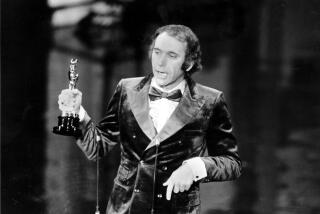Fighting the Studio Brass Along ‘Rocky’ Road to Success
- Share via
In the movie business, some things never change.
Just ask Irwin Winkler, who has made close to 40 movies over the last 29 years, including the “Rocky” series, “Raging Bull,” “Goodfellas,” “They Shoot Horses, Don’t They,” “The Right Stuff,” “Round Midnight” and dozens of others.
“The day the studio gives you all the reasons not to make a movie is probably the day you should say, ‘This is going to be a good movie and I should make it,’ ” said the 62-year-old producer-director, who’s among only a handful of veteran Hollywood filmmakers who have toughed it out for nearly three decades and whose films have won multiple Oscars.
One of those, “Rocky,” which won three in 1976, including best picture, is being honored tonight on its 20th anniversary at a special screening at the Academy of Motion Picture Arts and Sciences.
Winkler and his former 17-year partner Robert Chartoff met with a lot of resistance when they tried to convince United Artists to let neophyte Sylvester Stallone star in a movie he had written.
“They said ‘Yeah, we’ll do it,’ but they wouldn’t do it with Stallone. They said they’d do it with either Ryan O’Neal or Burt Reynolds,” recalled Winkler in an interview this week in his Beverly Hills office, which is lined with movie posters of the many films he’s produced.
Winkler and Chartoff, who had an exclusive producing deal at UA, decided to exercise a provision of their agreement with the studio enabling them to make any movie of their choice costing up to $1.5 million.
“They [UA] did a budget which was $2 million,” said Winkler, explaining that’s how the studio could get around the producers’ deal and make the movie with the star of their liking.
“We had a meeting with Mike Medavoy, who was head of production at UA, and we had a big fight,” recalled Winkler. “During the meeting we said, more in anger than in sensibility, that we’d do the picture for a million dollars and we’d guarantee its completion, therefore they couldn’t say it was a $2-million picture.”
That meant the producers signed a personal note agreeing to pay for any overages if the movie cost more than its $1-million budget.
“I didn’t tell my wife until years later that our house was at risk,” said Winkler, who’s been married to the same woman for 37 years.
The movie, which Winkler said went $50,000 over budget, was a huge hit with audiences because of its everyman-overcoming-all-odds theme, grossing $117.2 million domestically. A story of personal redemption about a Philadelphia club fighter who becomes a world heavyweight contender, “Rocky” went on to spawn four sequels, which collectively grossed well over $1 billion worldwide.
In Winkler’s view, the original “Rocky” brought more than box office success. “For instance, we made that wonderful film over there,” he said, pointing to a poster of “Raging Bull,” starring Robert De Niro.
“They wanted us to make ‘Rocky 2’ and we said the only way we’d do it is if you finance ‘Raging Bull,’ ” he said. “They not only didn’t want to make ‘Raging Bull,’ [but] they told us in mid-production to try to sell it off to somebody else.”
He found that in all his years in Hollywood, the only movies that were relatively easy to get made were the “Rocky” sequels.
“It’s still tough; everybody looks for a reason to say no,” said Winkler, who made his debut as a director in 1991 with “Guilty By Suspicion,” a drama he wrote about the Hollywood blacklisting era that also starred De Niro.
When he first pitched the idea of starring Sandra Bullock in “The Net” to Columbia Pictures last year because he liked her performance in “Speed,” Winkler said he “almost got the Stallone reaction.” Finally, he said, former studio head Mark Canton, who had been a reader for Medavoy at UA, “said, ‘OK, if you feel strongly about it, we’ll do it.’ . . . Nothing changes.”
Years before the first “Rocky” was made, Winkler remembers that he and Chartoff had a tough time convincing the backers of “They Shoot Horses, Don’t They” to star Jane Fonda in such a serious film. It was hard enough trying to sell a film about a 1930s dance marathon in which a self-destructive girl [Fonda] at the end asks a guy to shoot her.
“How did we ever sell ‘Music Box?’ ” mused Winkler, about the script by Joe Eszterhas in which a Chicago criminal attorney, played by Jessica Lange, has to defend her Hungarian immigrant dad (Armin Mueller-Stahl) accused of war crimes.
“When UA put it in turnaround, we had one studio that said it would do it if at the end of the film she found her father was innocent. The whole point of the movie is that he is guilty.”
Winkler said he has always been attracted to dark material, which is a mystery even to him given that “I’m not an intense person.”
The father of three sons, two of whom are directors, Winkler said, “It’s true. I don’t know why I always end up with these dark movies. . . . I don’t think I’d know how to do a light romantic comedy.”
Early in his career, Winkler and Chartoff produced the 1971 comedy “The Gang That Couldn’t Shoot Straight,” which Winkler concedes “was kind of flat and I didn’t know what to do with it.”
The last movie the producers made together (other than the “Rocky” sequels) before dissolving their partnership was “The Right Stuff,” which was a box office dud, despite being nominated for eight Oscars, including best picture, and winning four in the editing, sound and original score categories.
Winkler is currently working on his next directorial outing, “Winds of Change,” a script he co-wrote with the president of his company, Rob Cowan, about a doctor whose life chronicles all the great American events of the 20-year period from the early 1950s through the Vietnam War.
Born in Coney Island, Winkler began his career in the mail room of the William Morris Agency in 1959, and after a short stint as, he said, “a lousy agent,” he went into the management business with Chartoff.
In 1966, the then-president of MGM, Robert H. O’Brien, asked the two to produce movies. Their first was “Double Trouble,” a film the producers thought Julie Christie would be perfect for, but the studio nixed for Elvis Presley.
More to Read
The biggest entertainment stories
Get our big stories about Hollywood, film, television, music, arts, culture and more right in your inbox as soon as they publish.
You may occasionally receive promotional content from the Los Angeles Times.










